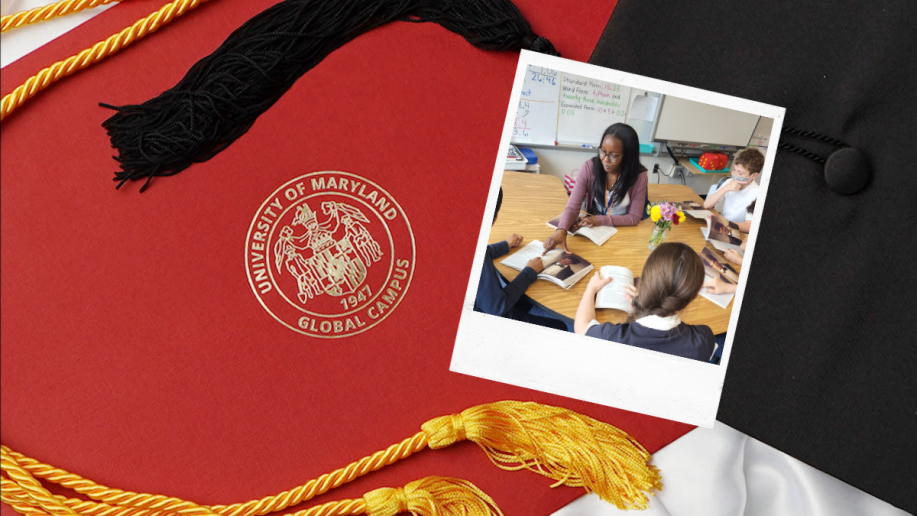
Tamaria Wadley started her Master of Education in Instructional Technology at University of Maryland Global Campus (UMGC) just weeks before her elementary school was forced into virtual classes by the onset of COVID-19. It didn’t take long before she was in demand by fellow teachers challenged by the overnight switch to online education.
When Wadley receives her graduate degree at UMGC’s May commencement, she will also carry an accolade from her first year at Lyles-Crouch Elementary School in Alexandria, Virginia. She was named Teacher of the Year for helping her colleagues navigate the jump to online education.
Wadley said her UMGC classes were “perfect timing.”
One class, K Through 12 Synchronous and Asynchronous Learning, taught her how to streamline online learning programs to get the most out of virtual teaching. “That’s when I got into the mindset of using the computer for enhancement, not just playing games,” she said. “That’s how I taught online when the new school year started, and my principal saw what I was doing and she told other teachers about it.”
Wadley was just beginning her job at Lyles-Crouch and knew nearly no one after transferring from another Alexandria school, but word got around. She started receiving emails from other teachers asking for help.
Born in Texas to a military family, Wadley had begun her college education at Howard University as a computer science major. But during her first year, she volunteered in a D.C. elementary school, teaching math and literacy skills.
“I saw that my need was better met in elementary teaching and not computer science,” she said.
Howard had no undergraduate education degree, so Wadley transferred to the University of Texas at San Antonio. She taught fourth grade in Houston for five years. When her family moved to Virginia, she followed and taught for a year in Prince William County and then in Alexandria City Public Schools.
“That’s when I found my love for computers again, finding activities for students on the computer or making activities,” she said. “Teachers would come and ask me for help. I found that there’s a position where you can get paid to do that, instead of doing it for free. I set my goal to become a technology integration specialist.”
Wadley was attracted to UMGC because that is where her mother earned a degree—at age 56—after retiring from the Air Force and working as a government contractor at Marine Corps Base Quantico.
“With her going back to school and working full time, I said, ‘Tamaria, you can do this.’ UMGC had the exact program I wanted. I would be able to teach teachers how to use technology, which is what I wanted to do,” Wadley said.
She started the program in January 2020. When the pandemic hit in March, she assumed the students would be gone from classes only for a couple of weeks. Once the weeks stretched and virtual teaching kicked in full time, Wadley relied on her good understanding of computers from her time at Howard.
“The difficult part came in helping my teammates. That’s when the UMGC courses came into play,” she said. “I had to make an entire website for one of my courses, and then I sent it to my teammates, and I said, ‘You can use all of this stuff on here.’”
The UMGC program was asynchronous, so Wadley could fit it into her schedule. Most of the professors taught in public schools, and they had plenty of practical experience. What Wadley had to learn to do as a technology administrator was to get computer information to other educators.
She said the feedback from her UMGC professors was unparalleled.
“It wasn’t just one and done. They gave me their phone numbers. You could text them and get instant feedback, even at 9:30 at night. Some even offered face-to-face Zoom interaction, which is great because sometimes it gets lonely only learning online,” she said.
With her degree in hand, Wadley is ready for the next step—becoming a technology integration specialist in her school and working one-on-one with teachers to introduce programs.
“Say a teacher is doing a math lesson on decimals, and he or she says, ‘Hey, I really want to do something fun with technology-based teaching.’ I would come up with the lesson, and then teach it to the students and to the teacher,” Wadley explained.
As she worked her way through her UMGC courses, Wadley had help from an unexpected corner: eager fourth graders whose work samples found their way into her college courses.
“I like to tell my students they were my guinea pigs throughout my entire time at UMGC,” she said.

Share This